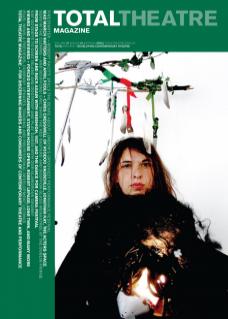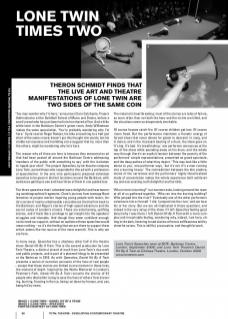‘You may wonder why I’m here,’ announces Clare Catchpole, Project Administrator at the Guildhall School of Music and Drama, before a small crowd who has just been led into her shared office. And a little while later in the Barbican Centre’s green room, Andy Williamson makes the same speculation, ‘You’re probably wondering why I’m here.’ Cycle courier Roger Ramjet, his bike screeching to a halt just short of the same crowd, doesn’t put this thought into words, but his visible nervousness and trembling voice suggest that he, more than the others, might be wondering why he’s here.
The reason why all three are here is because they answered an ad that had been posted all around the Barbican Centre addressing ‘members of the public with something to say’ with the invitation to ‘speak your mind’. The project Speeches, by UK theatre company Lone Twin, paired those who responded to this ad with a professional speechwriter. In the end, nine participants prepared individual speeches to be given in distinct locations around the Barbican, with audiences getting to see and hear three of them in one guided tour.
The three speeches that I attended were delightful and heartwarming autobiographical fragments: Clare’s journey from teenage Beatlemaniac to project worker inspiring young people with music; Andy’s series of nearly unbelievable coincidences that led him back to the Barbican; and Roger’s stories of high-speed adventure and the secret codes of London’s streets. These are entertaining, uplifting stories, and it feels like a privilege to get insight into the speakers’ struggles and triumphs. And though they seem confident enough not to need our support, without an audience these speeches would mean nothing – so it’s the feeling that we are there to support them which seems like the source of the most warmth. This is why we are here.
In many ways, Speeches has a shadowy other half in the theatre show Daniel Hit By A Train. This is the second production by Lone Twin Theatre, a distinct strand of work from Lone Twin’s duo work and public projects, and is part of a planned trilogy to be presented at the Barbican in 2010. As with Speeches, Daniel Hit By A Train presents a series of narrative accounts of the lives of real people – except that these stories are limited to one moment in those lives, the moment of death. Inspired by the Watts Memorial in London’s Postman’s Park, Daniel Hit By A Train recounts the stories of 53 people who died while trying to save the lives of others from drowning, burning, freezing in the ice, being run down by horses, and, yes, being hit by trains.
The material is heartbreaking: most of the stories are tales of failure, as more often than not both the hero and the victim are killed, and the situations seem so desperately inevitable.
Of course houses catch fire. Of course children get lost. Of course rivers flood. But the performance maintains a frenetic energy of forced cheer that never allows for gloom to descend. In song, and in dance, and in the incessant beating of a drum, the show goes on. ‘It’s big. It’s bad. It’s breathtaking,’ one performer announces at the top of the show while pounding away on his drum, and the whole way through there’s an explicit tension between the poverty of the performers’ simple representations, presented as grand spectacle, and the deep pathos of what they depict. ‘This may look like a little dance to you,’ one performer says, ‘but it’s not. It’s a man running into a burning house.’ The contradiction between the dire predicaments of the narratives and the performers’ highly theatricalised mode of presentation makes the whole experience both exhilarating and excruciating, both delightful and horrible.
‘Who in here is burning?’ our narrator asks, looking around the room at all of us gathered together. ‘Who ran into the burning building? Who jumped into the river?’ Eventually one of the other performers volunteers him or herself. ‘I did. I jumped into the river,’ and we hear his or her story. But we are all implicated in these questions, and indeed in the very setup of the show. If I left Speeches feeling good about why I was there, I left Daniel Hit By A Train with a more complex and irresolvable feeling, wondering why, indeed, I am here, sitting in the dark, listening to sad stories of heroic selflessness told by cheerful actors. This is skillful, provocative, and thoughtful work.
Lone Twin’s Speeches seen at BITE, Barbican Centre, London, September 2008; and Lone Twin Theatre’s Daniel Hit By A Train at Chelsea Theatre, London, October 2008 www.lonetwin.com

